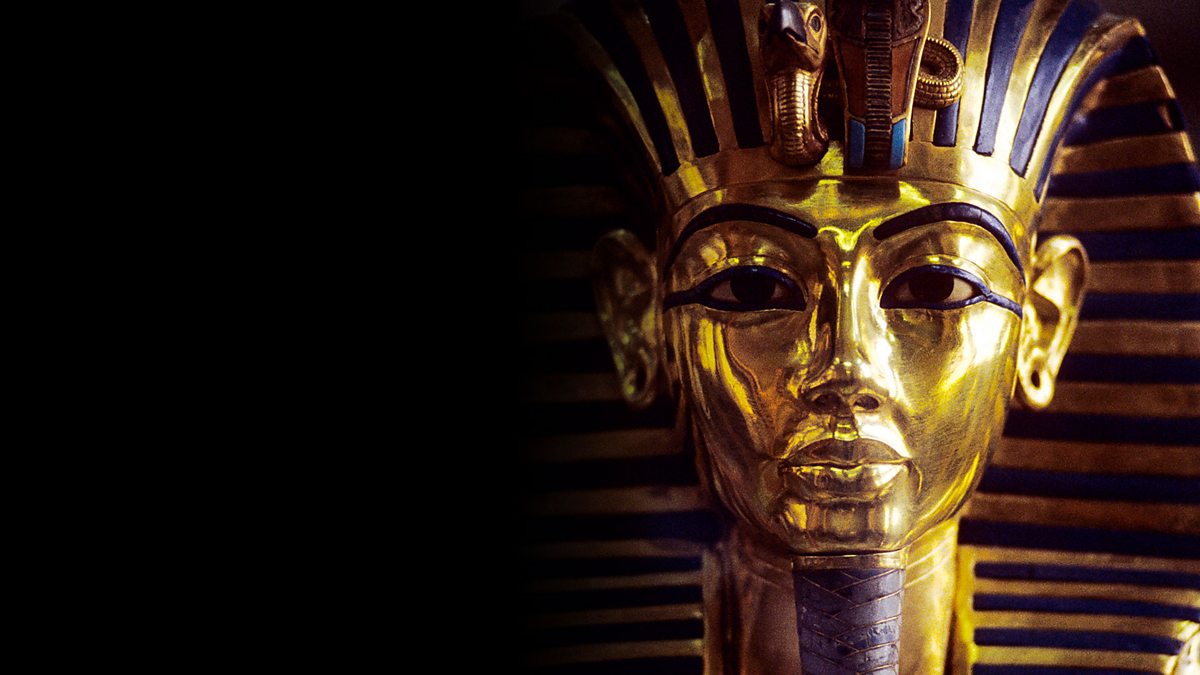
The Everlasting Odyssey of Ancient Egyptian Civilization
The resonance of the Ancient Egyptian civilization continues to reverberate within the collective consciousness of humanity, persisting as an indelible legacy up to the present day. Spanning over 5,000 years, this civilization pioneered the earliest known paradigms across an array of scientific, cultural, artistic, and intellectual domains, encapsulating the expanse of human knowledge. Nestled along the banks of the Nile River, Egypt’s ascendance was nurtured by the fertile soil and cyclic inundations, which catalyzed the cultivation of crops and laid the foundation for the world’s initial cohesive societal entity within its contemporary geographic confines. Over time, this civilization fostered a structure of governance, law, and order that catalyzed innovation and propelled progress to celestial heights, akin to the distant stars.
Since 1985, Egypt Tours Expert has steadfastly undertaken the role of custodian for this monumental heritage, offering global travelers an unparalleled avenue to delve deeply into the troves of wisdom and components that culminated in the genesis of mankind’s most extraordinary civilization.
The eminence of Egypt Tours Expert is borne of impeccable booking protocols and safety measures, a combination that has merited the company numerous accolades. This includes being designated as a Certified Travelers’ Choice by TripAdvisor for the year 2022 in Egypt, securing the esteemed Luxury Lifestyle Award for the Best Luxury Travel Agency in Egypt in 2020, clinching the Africa 2020 Award for the Best Cultural Experience Tours in Egypt from the distinguished Travel & Hospitality Awards Magazine, and amassing a plethora of glowing 5-star reviews on Feefo. These accolades are emblematic of the company’s unwavering commitment to excellence.
Pharaohs

Mythology

Artifacts

Battles

More Topics For Egypt Civilization
The enigmatic allure of the ancient Egyptian civilization has captivated the human imagination across the epochs of history. Its legacy, an opulent tapestry woven with innumerable accomplishments in art, culture, and architecture, continues to cast its spell even in the contemporary world. Amidst the annals of time, this civilization emerges as an enduring muse, beckoning seekers of knowledge and wonder.

King Akhenaten’s reign, characterized by his revolutionary religious beliefs and artistic endeavors, remains an unforgettable chapter in ancient Egypt’s history. His audacious departure from tradition and his quest to reshape the very fabric of Egyptian society make him a truly unique and captivating figure. The legacy of King Akhenaten serves as a reminder of the power of one individual’s vision to shape the course of an empire and leave an enduring impact on the world’s historical narrative Read More

Queen Nefertari’s impact on ancient Egypt is undeniable. Her elegance, devotion, and contributions to art and architecture have left an everlasting mark on history. As a symbol of beauty, strength, and royal partnership, Nefertari’s legacy serves as a reminder of the powerful women who shaped Egypt’s rich tapestry of civilization. Her memory lives on as an eternal queen, forever etched into the heart of Egypt’s story Read More

Queen Nefertiti’s legacy remains as radiant and captivating as her iconic bust. Her impact on art, culture, and Egypt’s history endures, a testament to the enduring allure of her regal charm. As the embodiment of beauty and power, Nefertiti’s influence resonates across the ages, forever immortalizing her as an eternal queen of ancient Egypt Read More

Ramses II’s legacy as a warrior, builder, and leader has solidified his place as one of Egypt’s most illustrious pharaohs. His accomplishments in military strategy, architectural achievements, and family life continue to inspire awe and admiration. Ramses the Great remains an embodiment of the power and splendor of ancient Egypt’s golden age, his monumental achievements standing as a testament to his enduring greatness Read More

King Tutankhamun’s reign may have been brief, but his legacy endures through the treasures he left behind. The boy king, who ascended the throne in his youth and departed the world prematurely, has become a symbol of the enduring allure of ancient Egypt. His tomb and artifacts continue to offer a window into the distant past, reminding us of the remarkable achievements and mysteries that lie within the sands of time Read More

Pharaoh Khufu’s reign left an everlasting imprint on the landscape of Egypt and the world. The Great Pyramid of Giza stands as a testament to his vision, ambition, and mastery of engineering. As we stand in awe before the pyramid’s colossal stones, we pay homage to the enduring legacy of King Khufu—a ruler whose mark on history can be seen not just in the grandeur of his creation, but in the fascination and wonder he inspires to this day Read More
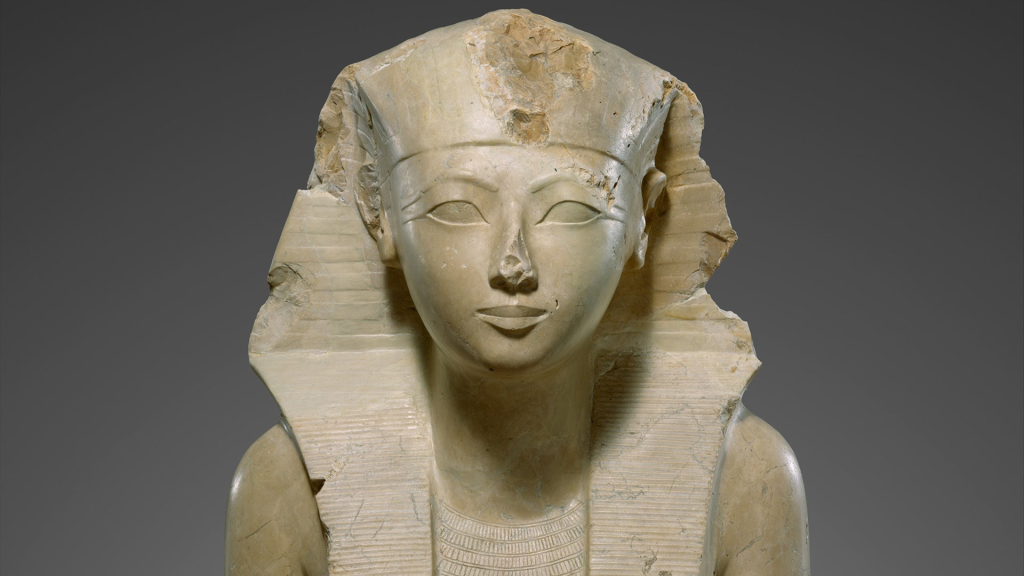
Queen Hatshepsut’s reign is a testament to the boundless potential of leadership, innovation, and determination. Her indomitable spirit led her to break boundaries and leave an indelible mark on Egypt’s history. As we admire the grandeur of her monuments and contemplate her achievements, we honor the legacy of a queen whose reign continues to inspire generations to embrace their own greatness and transcend the limits imposed by tradition Read More

King Khafre’s pyramid complex and the enigmatic gaze of the Sphinx continue to captivate visitors and scholars alike. The monuments stand as testament to his authority, ambition, and belief in the eternal afterlife. As we stand before the Second Pyramid and the Sphinx, we pay tribute to the enduring legacy of a ruler who left his mark on Egypt’s landscape and history, a symbol of royal might preserved through the sands of time Read More

King Menes, known as Narmer, stands as the architect of Egypt’s unification and the cornerstone of its storied history. Whether a conqueror or a symbolic figure, his reign marked a critical juncture in the formation of Egypt’s identity and cultural legacy. As we contemplate the unification palette and the image of the double crown, we honor the legacy of a ruler who united a land and set it on a course of greatness that would endure through the ages Read More
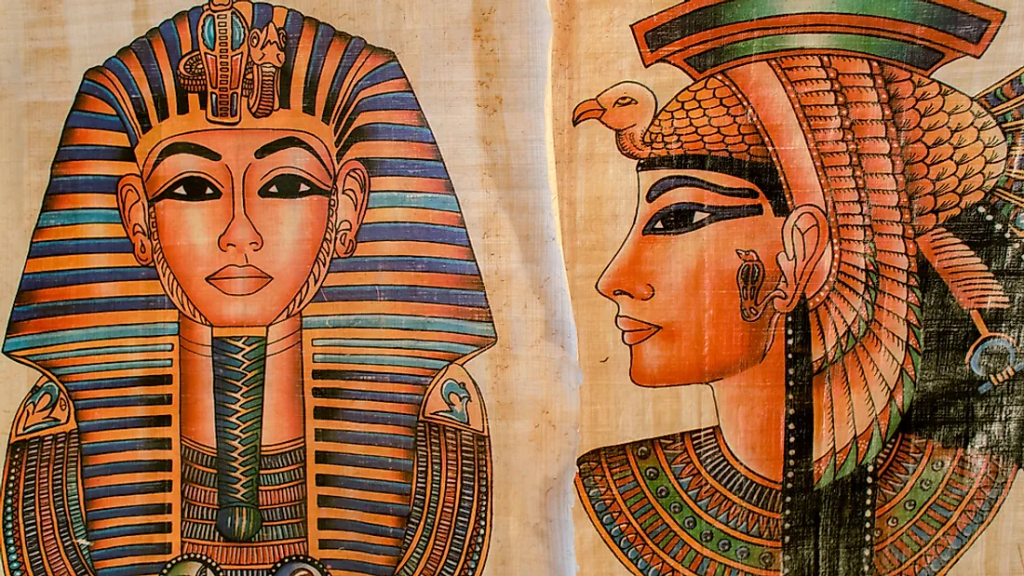
The Greco Roman Period { Queen Cleopatra }
Queen Cleopatra’s reign encapsulates the transformative nature of the Greco-Roman Period in Egypt’s history. Her alliance with Rome, her cultural revival, and her legendary love affairs remain etched in history’s memory. As we reflect on her life and times, we honor Cleopatra’s legacy as a leader, diplomat, and symbol of resilience who navigated the crossroads of civilizations and left an enduring mark on Egypt’s narrative and the world’s imagination Read More

The Most Famous Rulers of Egypt
The most famous rulers of Egypt stand as guardians of a civilization that has left an indelible mark on humanity. From unification to architectural marvels, their reigns have shaped Egypt’s narrative and contributed to the enduring allure of the Land of the Pharaohs. As we stand in awe before their monumental achievements, we pay homage to their leadership, vision, and legacy that continue to resonate through the sands of time Read More

The Pharaoh’s Curse is a prime example of how myths and sensationalism can shape historical narratives. While the idea of a curse might capture our imaginations, it’s crucial to separate fact from fiction and approach historical events with a critical perspective. The allure of ancient Egypt’s mysteries is undeniably compelling, but understanding the true context behind these tales allows us to appreciate the rich history and cultural legacy of this ancient civilization without falling prey to unfounded superstitions Read More

Alexander the Great’s journey from Macedonia to the edges of the known world is a saga of conquest, exploration, and transformation. His legacy embodies the power of individual agency, leadership, and the pursuit of greatness. As we reflect on his achievements, we honor the enduring spirit of a visionary who reshaped history and left an indelible imprint on the fabric of human civilization Read More
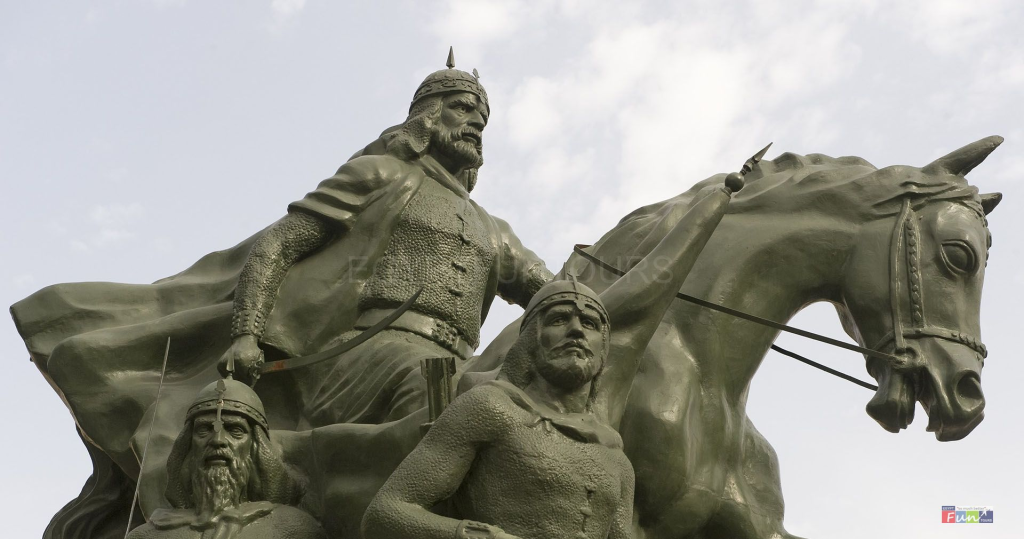
Emperor Salah al-Din’s life is a testament to the power of leadership driven by honor, strategy, and respect for humanity. His unwavering commitment to justice, his prowess on the battlefield, and his legacy of unity in a fractured world have left an enduring impact. As we reflect on his remarkable journey, we honor the memory of a leader who embodied the values of chivalry, courage, and the pursuit of righteousness—a legacy that echoes through the ages Read More

Muhammad Ali Pasha’s reign stands as a pivotal chapter in Egypt’s history, marked by sweeping reforms, modernization, and nation-building. His visionary leadership and commitment to progress shaped the trajectory of Egypt, leaving an indelible mark on its culture, infrastructure, and identity. As we reflect on his accomplishments, we honor the memory of a leader who shaped the modern face of Egypt and whose legacy continues to inspire and influence the nation’s journey toward the future Read More

Top Ten Fascinating Facts About Pharaohs
The world of pharaohs is a captivating tapestry woven with divine kingship, monumental achievements, and intricate beliefs. From their divine authority to their architectural marvels, pharaohs’ influence resonates through the ages, enriching our understanding of history and inspiring awe. As we uncover more about their lives and contributions, we are reminded of the indelible mark they left on the sands of time Read More

King Seti I’s legacy is one of grandeur, military prowess, architectural marvels, and a dedication to history and culture. As a warrior pharaoh and patron of the arts, he left an indelible mark on Egypt’s history, contributing to the New Kingdom’s enduring legacy. From his awe-inspiring Abydos temple to his role as a diplomat and strategist, Seti I’s influence resonates through the ages, reminding us of the remarkable achievements of ancient Egypt’s rulers Read More

King Amenhotep III’s reign shimmered with opulence, cultural achievements, and diplomatic finesse. His devotion to architectural marvels, artistic beauty, and strategic alliances left an indelible mark on ancient Egypt’s history. As we unravel the layers of his reign, we discover a pharaoh whose legacy illuminates the dazzling splendor of Egypt’s Golden Age and whose influence continues to shine through the sands of time Read More

Top 100 Ancient Egyptian Gods & Goddesses (Names & Facts)
The ancient Egyptian pantheon is a vast tapestry of gods and goddesses, each contributing to the intricate fabric of the civilization’s spiritual beliefs. From powerful deities like Ra and Osiris to protective figures like Anubis and Hathor, these gods and goddesses played essential roles in guiding both the mortal and afterlife journeys. Exploring their names and stories not only sheds light on ancient Egyptian culture but also reminds us of the enduring human fascination with the divine and the mysteries beyond our understanding Read More

Egyptian Mythology Creation Story
The Egyptian creation myth paints a vivid and intricate portrait of the universe’s emergence from chaos, shaped by the divine utterances of Atum. This myth not only provides insight into the ancient Egyptians’ understanding of their origins but also reflects their reverence for the natural world and their deep connection to the forces that governed it. As we delve into this creation narrative, we are reminded of the timeless human quest to make sense of the cosmos and our place within it Read More
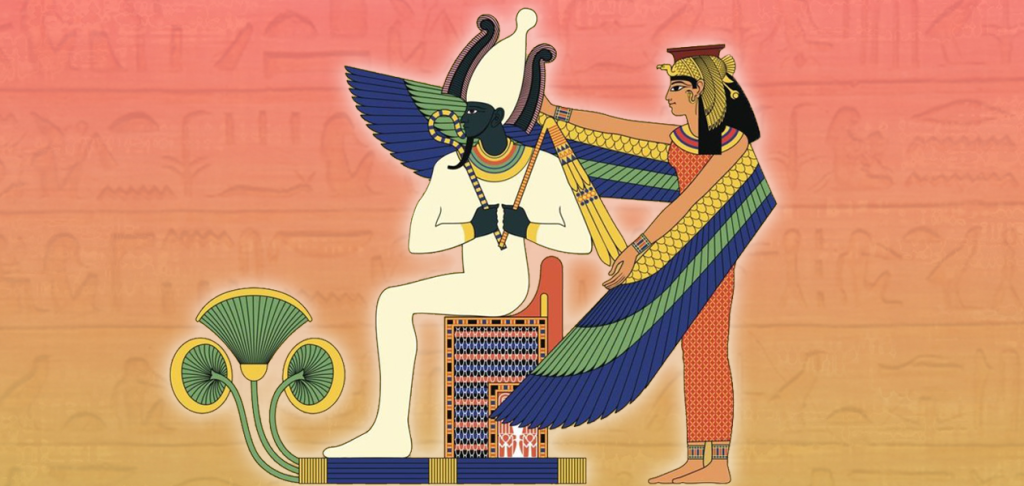
The Egyptian Mythology Story of Osiris
The myth of Osiris is more than a tale of gods and deities; it is a profound exploration of life’s cyclical nature, the inevitability of death, and the promise of rebirth. Through Osiris’s trials, the ancient Egyptians found solace in the concept of eternal life and the potential for spiritual transformation. This narrative served not only as a source of religious significance but also as a cultural touchstone that resonated throughout Egyptian society. Even today, the myth of Osiris continues to inspire contemplation about mortality, renewal, and the enduring pursuit of righteousness Read More

Ancient beliefs about the afterlife and judgment provided a framework for understanding mortality, ethics, and the divine order. The intricate rituals, symbolic practices, and vivid mythology associated with the journey to the afterlife not only shaped ancient Egyptian society but also serve as a timeless reminder of humanity’s quest for meaning beyond the confines of earthly existence. Whether navigating the Hall of Ma’at or embarking on a spiritual journey, these beliefs reflect the enduring human desire to transcend the limitations of the physical world and seek a greater understanding of what lies beyond Read More

60 Famous Ancient Egyptian Symbols (Meanings & Facts)
These 60 symbols offer a mere glimpse into the rich tapestry of ancient Egyptian culture, beliefs, and symbolism. From the sacred ankh to the awe-inspiring Eye of Horus, each symbol carries a unique story that connects us to the mystique of a civilization that revered the divine, sought cosmic balance, and wove these intricate meanings into the very fabric of their lives. As we explore these symbols, we stand on the threshold of understanding a culture that lives on through its symbols, etching its mark on history and inspiring wonder for generations to come Read More

The Book of the Dead remains an enigmatic treasure trove of wisdom and spirituality, connecting us to the profound beliefs of ancient Egyptians. Through its spells, symbols, and illustrations, this ancient guide beckons us to ponder the mysteries of life, death, and what lies beyond. As we explore its pages, we are reminded that the Book of the Dead was more than a guide—it was a vessel that carried the hopes, fears, and aspirations of a civilization that sought to transcend the boundaries of mortality and embrace the eternal embrace of the afterlife Read More
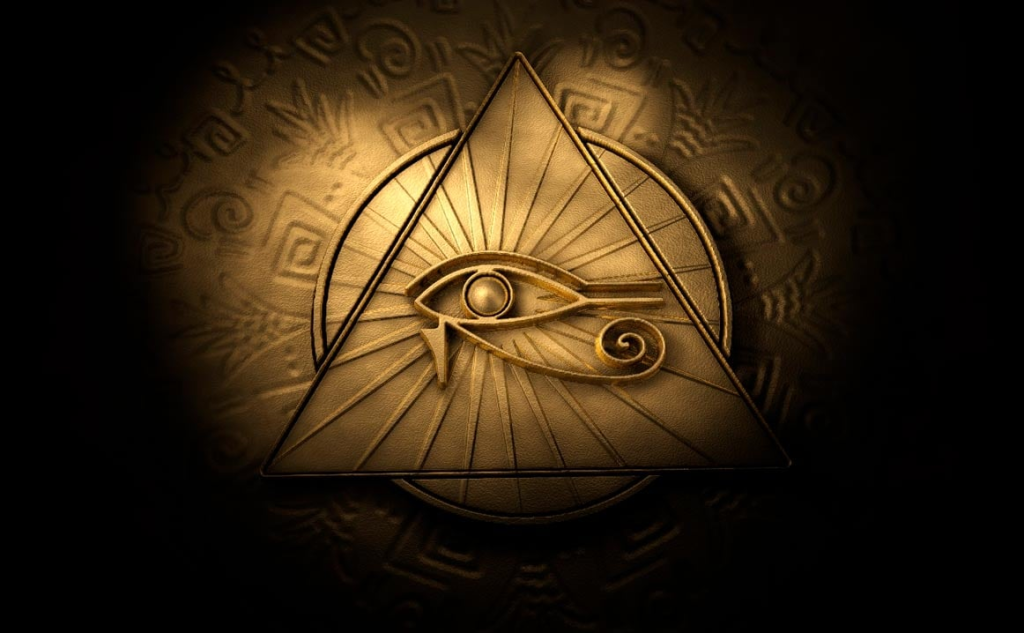
The Eye of Horus transcends its role as a mere visual motif; it encapsulates a tapestry of meanings that resonate across time and culture. As we contemplate this symbol, we are reminded of the ancient Egyptians’ profound understanding of the cosmos, their deep connection to the divine, and their eternal pursuit of wisdom and protection. The Eye of Horus, forever vigilant and all-seeing, invites us to peer beyond the surface and embrace the mysteries that lie beneath Read More

The Djed pillar’s symbolic resonance transcends time, encapsulating the ancient Egyptians’ deep spiritual connection with the cosmos, their reverence for Osiris, and their steadfast belief in stability and renewal. As we contemplate the Djed pillar, we are invited to embrace the enduring lessons it imparts—the importance of resilience in the face of adversity, the pursuit of cosmic harmony, and the eternal cycle of life, death, and rebirth that echoes through the ages Read More

The Was scepter stands as a testament to the ancient Egyptians’ profound understanding of leadership, divine order, and the sacred bond between the mortal and divine realms. As we contemplate the intricate design of the scepter and the deities it embodies, we are reminded of the enduring human quest for authority, the pursuit of cosmic harmony, and the eternal connection between earthly rulers and the divine forces that guide their reigns. In the Was scepter, we find not only a symbol of power but a symbol of the intricate tapestry of beliefs that shaped ancient Egypt’s cultural and spiritual landscape Read More
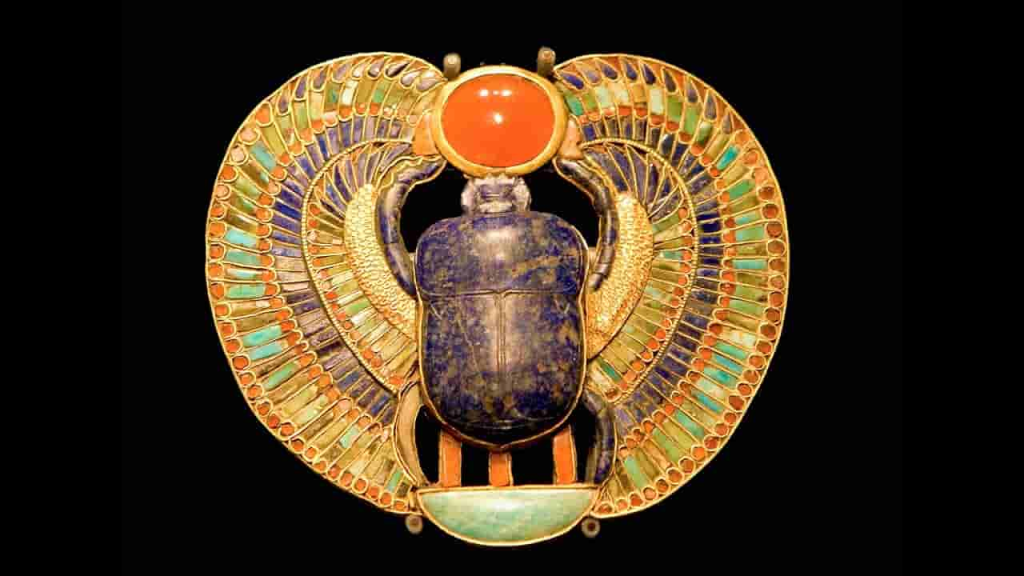
The scarab beetle’s symbolism transcends the bounds of time, inviting us to explore the ancient Egyptian perspective on the cyclic nature of existence. As we contemplate the image of the scarab rolling its ball of dung, we are reminded of the profound wisdom embedded in this seemingly simple act—a testament to the interconnectedness of life, death, and rebirth. The scarab beetle, with its enduring presence in ancient Egyptian culture, serves as a timeless reminder of humanity’s quest for meaning, transformation, and the eternal cycles that shape our understanding of the cosmos Read More

The Ouroboros, with its timeless representation of infinity, cycles, and unity, remains a profound symbol that transcends cultural and temporal boundaries. As we contemplate the image of the serpent consuming its own tail, we’re invited to ponder the intricate dance between creation and destruction, the harmony of opposites, and the enduring quest for self-realization and transformation. The Ouroboros whispers to us the eternal truth that all things are connected in the eternal cycle of existence, echoing through the ages as a symbol of wisdom and insight Read More
Best Holidays To Egypt

4 Days Nile River Cruise Aswan to Luxor
Discover the essence of Egypt’s ancient history as you cruise along the Nile River from Aswan to Luxor. This 4-day journey takes you to iconic landmarks, including the Aswan High Dam, the Philae Temple, Kom Ombo Temple, Edfu Temple, and the remarkable Valley of the Kings in Luxor. Onboard your luxurious cruise ship, indulge in world-class amenities and enjoy the panoramic views of the Nile’s ever-changing landscapes. Our expert guides will provide insights into Egypt’s fascinating past, making this an educational and immersive experience for all travelers View Tour Details

5 Days Nile River Cruise Luxor to Aswan
Explore the heart of Egypt’s history on a 5-day Nile River Cruise from Luxor to Aswan. This carefully curated itinerary encompasses a wide array of historical gems, from the renowned Karnak Temple Complex and Valley of the Kings in Luxor to the twin temples of Kom Ombo and the grand Edfu Temple. Cruise leisurely along the Nile River, relishing the charm of the surrounding landscapes. Our knowledgeable guides will enrich your journey with fascinating tales and insights into the rich tapestry of Egypt’s past View Tour Details

4 Days Cairo and Abu Simbel Tour Package
Embark on an unforgettable 4-day tour package to Cairo and Abu Simbel, where ancient wonders and majestic temples await. Explore the iconic sites of Cairo, including the pyramids of Giza and the Egyptian Museum, before journeying to Abu Simbel to witness the breathtaking temples of Ramses II and Nefertari. With our carefully curated itinerary, knowledgeable guides, and inclusive services, this tour offers a compact yet immersive experience of Egypt’s rich history. Discover the secrets of the pharaohs, marvel at awe-inspiring architecture, and create lasting memories View Tour Details

5 Days Cairo and Alexandria Tour Package
Embark on a 5-day journey through Egypt’s most fascinating cities, Cairo and Alexandria. From the grand pyramids and ancient temples to the coastal beauty and cultural landmarks, this tour package is designed to showcase the best of both worlds. With expert guides, comfortable accommodations, and convenient transportation, you’ll have an immersive and hassle-free experience. Join us on this captivating adventure and create memories that will last a lifetime View Tour Details

6 Days Cairo, Luxor, Aswan & Abu Simbel Package
Embark on an extraordinary 6-day journey through the heart of ancient Egypt with our Cairo, Luxor, Aswan & Abu Simbel package. Begin your adventure in Cairo, where you’ll explore the iconic pyramids and delve into the treasures of the Egyptian Museum. Continue to Luxor and Aswan, where you’ll witness the grand temples along the Nile River, and conclude your tour with a visit to the awe-inspiring temples of Abu Simbel. With expert guides, comfortable accommodations, and hassle-free transportation, this package offers a comprehensive exploration of Egypt’s historic sites. Join us on this incredible journey and unlock the secrets of the pharaohs View Tour Details

7 Days Cairo, Luxor & Alexandria Tour
Experience the best of Egypt’s cultural and coastal attractions with our 7-day Cairo, Luxor & Hurghada holiday. Begin your journey in Cairo, where you’ll discover the iconic Pyramids of Giza, explore the ancient artifacts at the Egyptian Museum, and immerse yourself in the vibrant atmosphere of Egypt’s capital. Then, travel to Luxor, often referred to as the world’s greatest open-air museum, where you’ll explore magnificent temples, tombs, and archaeological sites. Finally, unwind in the idyllic beach destination of Hurghada, known for its pristine beaches and vibrant marine life. With comfortable accommodations, expert guides, and hassle-free transportation, this holiday package provides a well-rounded experience of Egypt’s rich history and natural beauty View Tour Details
Ancient Egyptian Civilization FAQs
1. When and where did the Ancient Egyptian civilization exist?
- The Ancient Egyptian civilization emerged along the Nile River in northeastern Africa around 3100 BCE. It lasted for several millennia, with different periods such as the Old Kingdom, Middle Kingdom, and New Kingdom.
2. What were the major achievements of Ancient Egypt?
- Ancient Egypt achieved remarkable accomplishments in architecture (pyramids, temples), engineering (irrigation systems), art (hieroglyphs, sculptures), medicine (mummification), astronomy (calendar), and mathematics (geometry).
3. What is the significance of the Nile River to Ancient Egypt?
- The Nile River was the lifeblood of Ancient Egypt. Its annual flooding deposited nutrient-rich silt that fertilized the land, enabling agriculture to thrive. It also provided a means of transportation and trade.
4. How were pharaohs regarded in Ancient Egyptian society?
- Pharaohs were considered divine rulers and were at the apex of Ancient Egyptian society. They were not only political leaders but also religious figures believed to have a direct connection with gods.
5. What were the roles of priests and priestesses in Ancient Egypt?
- Priests and priestesses played a central role in religious ceremonies and rituals, maintaining temples, and offering sacrifices to the gods. They were intermediaries between the people and the divine.
6. What were the pyramids, and why were they built?
- The pyramids were monumental tombs built for pharaohs and high-ranking officials in the Old Kingdom. The most famous are the pyramids of Giza. They were constructed to ensure the pharaoh’s safe passage to the afterlife.
7. What is the significance of hieroglyphics in Ancient Egypt?
- Hieroglyphics were the formal writing system of Ancient Egypt, consisting of symbols that represented sounds, words, and concepts. They were used for monumental inscriptions, religious texts, and administrative purposes.
8. How did Ancient Egyptians view death and the afterlife?
- Ancient Egyptians believed in an afterlife where the soul journeyed through the Duat, facing judgment and either being granted eternal life or facing annihilation. Mummification and proper burial were essential for a successful afterlife.
9. What were the roles of women in Ancient Egyptian society?
- Women in Ancient Egypt had various roles, including those of wives, mothers, priestesses, and artisans. Some women even held political power as queens and regents.
10. How did the Ancient Egyptian civilization come to an end?
- The decline of the Ancient Egyptian civilization can be attributed to factors such as foreign invasions, internal strife, economic challenges, and changes in political power. The conquest of Egypt by Alexander the Great marked a significant turning point.
11. What was the religion of Ancient Egypt like?
- Ancient Egyptian religion was polytheistic, with a vast pantheon of gods and goddesses. Religion permeated all aspects of life, from daily rituals to monumental construction. The pharaoh was often seen as the intermediary between gods and humans.
